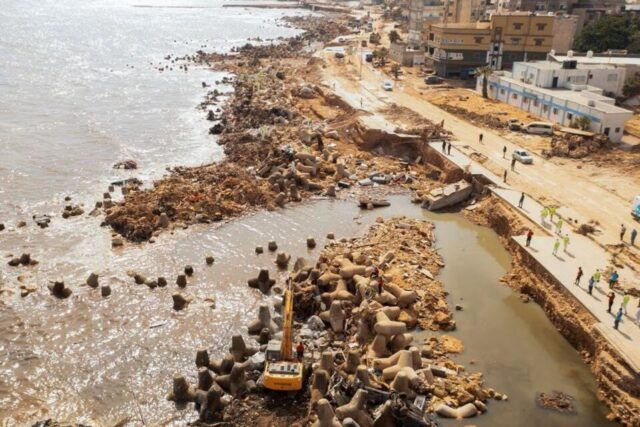People whose homes were swept away by flooding in Libya’s eastern city of Derna a week ago faced the dilemma on Sunday of whether to stay despite a lack of fresh water or flee through areas where landmines have been displaced by the torrents.
By Ahmed Elumami and Ayman al-Warfali
DERNA, Libya – People whose homes were swept away by flooding in Libya’s eastern city of Derna a week ago faced the dilemma on Sunday of whether to stay despite a lack of fresh water or flee through areas where landmines have been displaced by the torrents.
Thousands of people are feared to have died after two dams above Derna broke on September 10, bringing down residential blocks lining a usually dry river bed as people slept. Many bodies were washed out to sea and more than 1,000 have already been buried in mass graves, according to the United Nations.
Sunrise on Sunday revealed a scene of quiet devastation, with piles of rubble cleared to the sides of empty roads along with tangled metal including pieces of wrecked cars.
Hamad Awad sat on a blanket on an empty street with a bottle of water and bedding alongside him.
“I am staying in our area trying to clean it and trying to verify who is missing,” he said. “Thank God for giving us patience.”
Entire districts of Derna, with an estimated population of at least 120,000, were swept away or buried in brown mud. State media said at least 891 buildings had been destroyed in the city, whose mayor has said 20,000 people may have died.
Another resident said people were at a loss over what to do next.
“We still do not know anything, we are hearing rumours, some are trying to reassure us, others are saying you need to leave the city or stay here. We have no water and no resources,” said the resident, who gave just one name, Wasfi.
A report by the UN’s Office for the Coordination of Humanitarian Affairs (OCHA) said Libyan authorities had detected at least 55 children poisoned from drinking polluted water in Derna, where the homeless were surviving in makeshift shelters, schools or packed into the houses of relatives or friends.
Floodwaters had shifted landmines and other ordnance left over from years of conflict, posing an extra risk to the thousands of displaced people on the move, it said.
DISPUTED DEATH TOLL
The OCHA report said at least 11,300 people had died and more than 10,000 people were missing in Derna after Storm Daniel swept over the Mediterranean and into the city and other coastal settlements.
It cited the Libyan Red Crescent for the figure but a Libyan Red Crescent spokesman said it had not published a toll and referred Reuters to government spokespeople, saying “figures are changing and the Red Crescent is not responsible for this.”
An official from the administration that runs eastern Libya, Dr Osama Al-Fakhry, said: “The number of dead so far is 3,252, and they are those who were buried”.
He said 86 people had been pulled from the rubble and operations were continuing.
“There is no specific number regarding the missing, because there are entire families who have died and no one came to report them, in addition to the fact that there is duplication of registration in various hospitals,” said Al-Fakhry, office manager for the health minister in the east.
Other Libyan officials have previously citied a death toll of more than 5,000.
OCHA said more than 40,000 people had been displaced, cautioning that the figure was likely much higher since access had been restricted to the worst-affected areas such as Derna, where at least 30,000 were displaced.
International aid organizations have flown in emergency aid and countries have sent in supplies and other help, but OCHA said much more was needed.
Civil protection workers from Algeria combed through the rubble of multi-storey buildings with a dog to help detect any survivors.
In al Badya, a coastal settlement west of Derna, volunteers handed out clothing and food.
“People left their houses with nothing, they didn’t even have their underwear,” said one of the initiative’s supervisors, Mohammad Shaheen.
Volunteer Abdulnabi said the team came from Ajaylat, around 800 miles (1,200km) away in western Libya, divided from the east by more than a decade of on and off conflict.
“People are coming together to help those impacted,” he said.
The country of 7 million people has lacked a strong central government since a Nato-backed uprising that toppled Muammar Gaddafi in 2011.
Libya’s internationally-recognised Prime Minister Abdulhamid al-Dbeibah, based in Tripoli in the west, called the floods an unprecedented catastrophe. Libya’s Presidential Council head Mohammed al-Menfi has called for national unity.
– REUTERS








